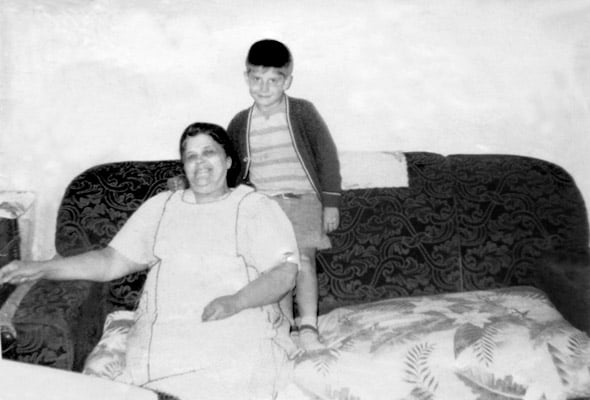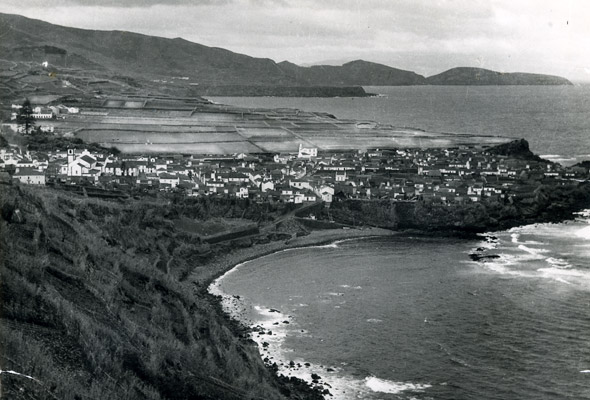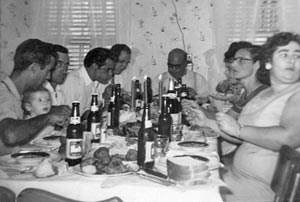

Clearly, something had to be done. So I approached my mother and aunts with a sheepish grin on my face and a video camera in my hand. My goal: to film family favorites being prepared before they too were lost. I wanted a permanent record of the food that filled three tables every Sunday when we laughed and talked (which to other families sounded like fighting), and my mother and aunts buzzed about happily shoveling their specialties onto our plates.

While they were eager to squeeze their way into the viewfinder, capturing their culinary heirlooms proved daunting. For example, there must have been a shortage of measuring cups and spoons in the Azores, because my mother and aunts cook only with pinches of this and handfuls of that. I had to yell “CUT!” more times than I care to recall to fish out a mound of parsley from boiling broth or catch a fistful of garlic midair in order to measure it properly.
Vocabulary proved another sticking point. While the National Live Stock and Meat Board categorizes beef into no fewer than 45 different cuts, it’s all just “meat” to my mother. Any further questioning was met with a shrug of her shoulders and — as if I were asking about sex — the admonition to discuss it with my father. In her intuitive, cookbook-free world, there were no fancy names or elaborate techniques. You simply rolled up your sleeves and began chopping.
But over time the recipes, as well as forgotten bits of family history, revealed themselves. I remembered summer days spent shucking fava beans with VoVo in her kitchen. And even though she sat there in just her slip plonking beans into a big white washtub at her feet, she looked like an empress. I joked with my mother about the ridiculous amount of food she makes every October for family and friends who help my father harvest his grapes for wine. Believe it or not, I even developed an appreciation, but certainly not a taste, for my Aunt Irene’s octopus stew.

I came to accept that our food defines us, whether we’re sitting at the kitchen table or not. Simply put, we are a family of immigrants — something I denied as a teenager by idolizing Big Macs and the Colonel’s original recipe. Anything to deep-six the Portuguese part of my Portuguese-American heritage.
Well, not any longer. My first visit to the Azores is scheduled for next fall. To prepare, I’m learning Portuguese, much to the hilarity of everyone. But most important, whenever I crave a taste of home, I just pop a cassette into the VCR and follow along with my mother and aunts — to me, the best collection of chefs on TV.












Hello, David, very beautiful what you said, and the way you said it, about your grandmother and their recipes. If you cook as well as you write, oh, my God, all of it must be irresistible.
From Maia, with friendship,
Daniel de Sá
Daniel, thank you for the kind works. Maia? That’s where my father’s family is from. He grew up on Rua dos Foros. Where are you?
Dear Friend, thank you for the answer. I lived thirty five years in the house on the corner, just next to your grandfather’s. Now I live next the manor house “Solar de Lalém.” I have many friends in your family, like the one that lives now in your grandfather’s house.
With friendship,
Daniel de Sá
Daniel, that is so incredibly touching to hear! And you still live in Maia! I considered, albeit very briefly, buying the house my father grew up in, but it’s now a part of another branch of my family. I will have my parents chime in–perhaps my Dad remembers your family.
This is our small World. And do you know who lived in the house just in front of mine until 1907? The grand grandfather of Craig Mello, the one that was awarded with the Nobel Prize in Medicine in 2006. His grandfather was the first child of the family born in USA. Rua dos Foros is a street of great grandfathers, what do you think?
With friendship,
Daniel de Sá
Daniel, I’d have to agree. That street–clearly–was touched by genius and heart. I’ve written my parents to see if they remember your family.
Dear Daniel, our son. David, sent us your comments regarding his story about our family and recipes. Thank you for introducing yourself to him. If my memory serves me correctly, your Dad’s name is José Daniel, and you’re the nephew of Lourdes Daniel. I believe your granddad was Mestro Antonio Ganilha.
How did I do? It’s been many, many years! 🙂
Take good care and please give our regards to everyone there who might remember my childhood in Maia and my family.
God bless you.
Manny & Elvira Leite
Dear Friends Manny and Elvira. Yes, my dear friends, I’m just the one you think. My father, my aunt, and all my uncles were known as “Daniel,” because it was my grandpa’s name. The other grandpa was really mestre António Ganilha, a legendary carpenter. He could do all he wanted with wood or iron. Last Monday I was talking with João da Ponte, brother-in-law of Elvira Leite, and I said something about your son, David. He told me he knows you and some years ago he visited you at your home. Do you remember?
With friendship,
Daniel
Hello Good Buddy Daniel: In speaking with family members, we believe Joao Da Ponte visited our Brother-in-law Manny Da Ponte Leite in Somerville and not us. Manny Da Ponte Leite is first cousin to Joao Da Ponte. In any event, we’re thankful that we were able to connect after all these years. I’ve not been back to The Azores since I left in 1959. A long time, eh? Thanks again for bringing fond memories to mind. Take good care and thanks for being in touch. David’s website has been a blessing to us in so many ways…….one of them being YOU! God bless you and your family, Manny & Elvira
Get more deliciousness at Lights, Camera, Recipes: Capturing a Portuguese Family’s Cooking | Leite’s Culinaria
David I love reading about your family, I have family that also came from the same island (Da Souza) and my Great Grandmother was also called VoVo, and my Grandmother was full-blooded Portuguese, but she passed away when I was only 12 years old; I was just beginning to learn to cook from her. I live in Louisiana, and some of the recipes that I have found do not seem to be to different from the cooking that I do.
Ginny, thank you for your kind words. It is amazing how similar the foods of different cultures can be. I find Southern cooking to be similar to Portuguese cooking: a lot of pork, kale/collard greens, beans, cornmeal/grits, etc. Good taste, apparently, know no borders.
Hi, my family ancestors also come from the Azores from what I am told. The only dish that was passed to me from my father’s side which they all lived in the San Jose, CA area was Portuguese Beans. It was made from pinto beans, ground beef, linguiça, green peppers, onions, and cilantro. I think that it was changed around a bit. Anyway, my daughter has to do a high school senior project, and she wanted to do it on Portuguese food, do you have any simple delicious recipes we can use? I found a few, like Portuguese sweet bread and your Deep-fried green beans and pinapple picando burger, they sound really good. I would appreciate it! I also wanted you to know my mom came from a Costa family, don’t know if it is a relation or not.
Hi Karen, what and exciting project. We have plenty of Portuguese recipes, many classic, some contemporary. You’ll find a full list of nearly 70 recipes here. Give my best to you daughter.